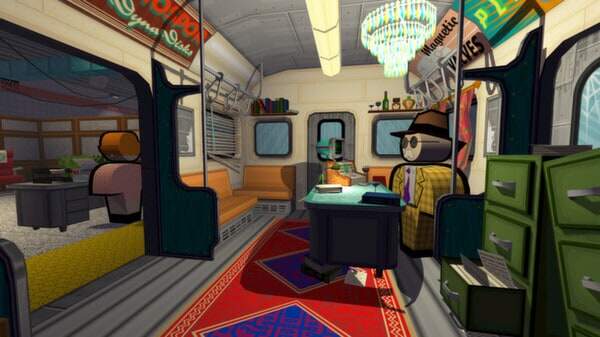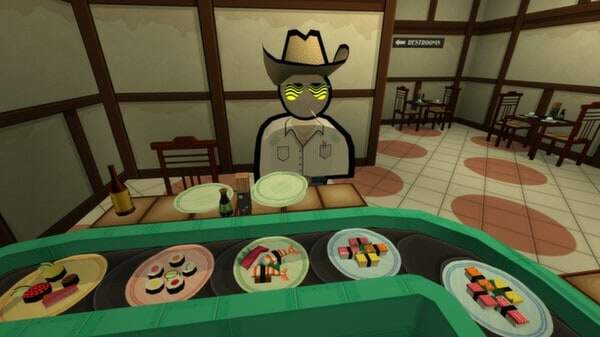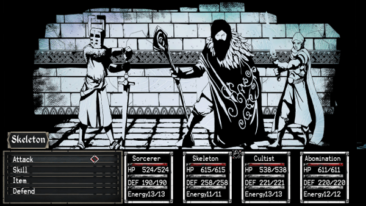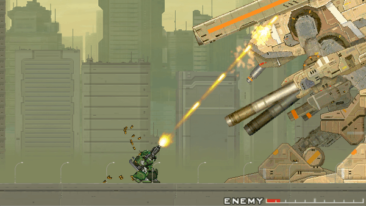Jazzpunk – What We Think:
Jazzpunk exists so far outside the typical video game parameters that it’s tough to know where to start the review. So let’s get right to the point:
Jazzpunk is extremely funny. But I can’t tell you why it’s funny because that would spoil the surprise, and then it wouldn’t be as funny. As with most comedy, the jokes are most effective when they’re unexpected.
So let’s talk about the premise instead. The latest effort from Necrophone Games is a loving send-up of Soviet-era spy fiction, though that’s a bit like saying Airplane! is a parody of Boeing. The scope of Jazzpunk extends well beyond covert antics. The framework provides a basic plot – you’re a spy and you infiltrate stuff – then fleshes out the narrative with references to anything that has everything to do with nothing.
Jazzpunk is also decidedly weird. The humor relies on strange juxtapositions and absurd non sequiturs, and your appreciation of the game will depend on your tolerance for silly puns and other such shenanigans.
Weird For The Sake of of Weird
Any recommendation similarly depends on your sense of humor. If you’ve enjoyed any of the trailers, then you’ll almost certainly like the game. The final product isn’t quite as manic because interactive products aren’t edited that efficiently, but it’s otherwise an accurate representation of Jazzpunk’s sensibilities.
What’s unusual is that I’m still not sure what that means. I know I played Jazzpunk. I know I (mostly) enjoyed it. But I’m not sure I understand it, which I find at once fascinating and maddening. It’s not often that a game proves so elusive.
So let’s keep going.
Keep Calm and Carry On
Mechanically, Jazzpunk hews closest to adventure games that follow the typical Lucasarts pattern. You find a thing, and then you figure out where to use the thing.
But most of the action takes place outside of the relatively straightforward plot progression. The game transitions across several open environments and most of your time will be spent exploring and pressing buttons just to see what happens. It’s a game dedicated to the Easter egg. You’ll find secrets hidden in cars and trashcans and computers and pigeons and damn near anything else you can imagine.
Since Jazzpunk is crammed with so much deliberate nonsense, it feels like it’s supposed to add up to something coherent, like a Magic Eye puzzle that becomes a sailboat if you stare at it long enough.
Then again, Jazzpunk might just be a collection of dots. Is there a lesson here? You could tell me the game is a thematic allegory for the whaling industry in the dwarf mines of a forest planet in the Andromeda Galaxy and I wouldn’t disagree. I wouldn’t agree either, but that’s the kind of interpretive nuttiness Jazzpunk inspires.
The Blue Pill
Jazzpunk builds a world in which the insane is both possible and probable, pushing every joke one step further than convention would dictate. The colorful artwork bolsters the concept – the characters all look and move like dolls made out of folded cardboard – as do the appropriately jazzy music and aesthetic. Jazzpunk is what The Matrix would have looked like had Agent Smith been designed by Playmobil.

The various creative choices complement each other perfectly, and the combination is seductive. Jazzpunk convinces you to accept an internal logic that only exists in its own alternate reality, holding your attention with vaudevillian gags and a deliciously smug villain who keeps the plot moving forward.
It’s a trip worthy of Hunter S. Thompson when everything comes together.
In on the Joke
Unlike most attempts at video game humor, where comedy is a poster on a wall or else relegated to static cut scenes, Jazzpunk recognizes that interactivity can elevate a mere reference into a memorable moment. Many of the jokes demand that you initiate the punch line, holding out an index finger and asking you to pull, because nothing happens if you don’t.
Jazzpunk is therefore a uniquely game-y parody, utilizing the medium to drive jokes towards conclusions that wouldn’t be possible in film. And while that’s the source of much of Jazzpunk’s charm, it’s also what makes Jazzpunk frustrating.
The game’s wit takes full advantage of the tools available, opting for frequent breaks for mini-games culled from genres as disparate as first person shooters, sports, and fighting. Many of the mini-games – all presented without tutorial – are hilarious, and rank amongst the game’s highlights.

The catch is that interactive jokes demand user-friendly inputs – there’s no joke if the player can’t pull the finger – and there’s no getting around the fact that Jazzpunk’s controls are clunky and unwieldy and woefully ill suited for anything beyond point-and-click. For the most part, that’s not a problem. Jazzpunk is incredibly forgiving and gameplay ability is never imposed as a barrier. You don’t have to win in order to proceed, and failure is usually part of the joke anyway.
But playing games you’re expected to lose, and then having to do it again, isn’t all that much fun, especially during one futile sequence near the end. You might find forced obsolescence morbidly amusing, but there are limits to what any given individual will be willing to endure. Poorly optimized controls strain those limits because the game world cracks to reveal the screen behind it.
Jazz Hands!
The thing is, I can’t shake the notion that that might be the point. Jazzpunk incorporates dozens of genres and then demonstrates how delightfully ridiculous it is when someone slams them together. In that vein, Jazzpunk wants you to recognize that standard entertainment – where movies and games rigidly adhere to the tired rules of one genre – is boring when measured against chaos. It finds vitality at the intersection of jagged media edges, where the collision creates a kinetic mess of exploded expectations.
If that’s the case, then Jazzpunk’s indiscretions are there to highlight the breaks in the frame, to take you beyond The Matrix. The flaws become intrinsic to the appeal because imperfections are beautiful, and that’s what makes Jazzpunk so special. It’s a celebration of difference, and no further justification is required. You might not necessarily ‘get’ it, but you don’t have to as long as the journey is entertaining.
Jazzpunk – Official Site
Get Jazzpunk on Steam
[xrr rating=”4.5/5″]



